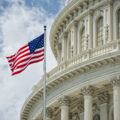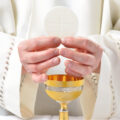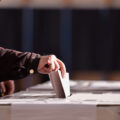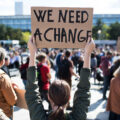The role of Catholicism in the 2020 election
The role of Catholicism in the 2020 election
This article was written before the 2020 elections, in preparation for our round table on the topic.
Joe Biden is the fourth Catholic to be nominated for a major party presidential ticket and the only Catholic vice president in U.S. history. It took the United States 172 years from the time of its founding to elect its first Catholic president – President John F. Kennedy. Since that historic moment, there has only been one other Catholic presidential nominee, John Kerry (2004). Needless to say, a win for Biden – an Irish Catholic – would be a monumental moment in American history and for Catholic representation.
However, a lot has happened in the last 60 years since Kennedy was elected. Biden has not faced the anti-Catholic bigotry Kennedy endured, but neither are his fellow American Catholics still overwhelmingly Democrat.[1] [2] [3] Further, Kennedy had significant Catholic support in part because he was the first major candidate Catholics could claim as their own. However, in comparison to their share of the U.S. population, Catholics are now overrepresented on Capitol Hill and the Supreme Court.[4] All this to say, it is unclear what effect, if any, Biden’s Catholicism will truly have on the election outcome.
From Kennedy to Biden
Biden’s approach to governing – separating the secular sphere from the sacred sphere – is “straight out of the Kennedy lineage.”[5] These fellow Irish Catholics have both distanced themselves from the pontiff [6] [7] and been quite open about ascribing to a more cultural Catholic faith.[8] [9] [10] However, the campaign challenges they have each experienced and the questions they have fielded over their personal faiths could not be more different.
Kennedy faced “resistance and outright anti-Catholic bigotry” from both conservative Protestant pastors and within his own party.[11] [12] The Protestant pastors argued that a Roman Catholic president would always “be more loyal to the Vatican because the fate of his eternal soul was at stake.” [13] Catholics in the 1950s and 60s were also still “easy to distinguish from their wealthier white Protestant counterparts,” as they were still predominantly immigrants.[14] Needless to say there was also a decidedly xenophobic prong to their argument that Catholics were simply too “weird, foreign, dirty, [and] oddly ritualistic” to lead.[15]
Conversely, Biden is in good company of fellow prominent Catholic leaders and public figures. His faith is a “highly visible part of his political persona,” and he carries a rosary at all times.[16] He also regularly incorporates his faith in his speeches.[17] [18] This is largely because, unlike Kennedy, his concern is not that voters would see him as too religious or too Catholic. Rather, he wants to ensure America knows, particularly the conservative Catholics and evangelicals who voted for Trump in 2016, that he is religious enough to win their vote.[19]
This difference is a product of yet another shift. In Kennedy’s time, religion was more publicly present – daily prayers in public schools, higher church attendance, etc. Thus, there was no need for politicians to identify as Christians because Protestantism was considered “America’s default faith.” [20] However, religion has since lost its 1950s and 60s prominence, something conservatives greatly lament.[21] Consequently, to appeal to this base, contemporary politicians make their faith a prominent characteristic to assure this sub-group they are a remnant of this bygone era.
A ‘Catholic voting bloc’?
These campaign differences are products of a much larger shift in the American electorate, the economic and social status of American Catholics, and the Catholic faith. When Kennedy successfully took on America’s anti-Catholic bias, he did more than successfully break the WASP[22] “stranglehold on the White House.” [23] Kennedy’s win aided in shifting the American perception of Catholics from one of suspicion to allyship.[24] Right-wing protestants no longer saw Catholics as the enemy, but rather as recruits for their broad pan-Christian movement that sought to defend their decreasingly popular conservative ideals of family and society.[25] [26]
Simultaneously, American Catholics were changing in status and conviction. In 1960, Kennedy claimed 70% – 83% of Catholic voters.[27] As predominantly poor immigrants, many Catholic voters had strong beliefs on social justice and wage equality.[28] In part because of the very social policies they advocated for, the group slowly joined the middle class and assimilated into American life.[29] As later generations became more indistinguishable from their conservative Protestant counterparts, they abandoned their parents’ party and voted Republican.[30] [31] These shifts have all manifested into hurdles Biden must now overcome if he is to win in November.
American Catholics account for 23% of all voters nationally, but they are far from being a monolithic, cohesive voting group.[32] [33] Like Biden, there are liberal-leaning Catholics who adhere to a localised faith – they are not beholden to church leadership, they keep their religious beliefs separate from their civic interests, and their faith’s primary purpose is to offer “solace in moments of anxiety or grief.”[34] [35] However, there is also a notable percentage of conservative adherents who feel, like several vocal members of the Catholic hierarchy, that Biden is not Catholic enough.[36] This is the sub-group that has denied him communion on multiple occasions[37] and the group of adherents he is now fighting to win over from Trump’s base with targeted, religious messaging.[38] [39] [40]
Abortion – a battle of two Catholicisms?
With the recent passing of Justice Ruth Bader Ginsburg, there has been significant discussion focused on the issue many consider to be the most divisive among religious voters – abortion. The late Justice Ginsburg was a vocal women’s rights advocate and considered the liberal stronghold of the Supreme Court. Republicans are now keen to fill her seat with an individual many consider to be Justice Ginsburg’s political opposite – Judge Amy Coney Barret. Judge Barret’s devout Catholic beliefs are of particular concern to Democrats as she has a clear pro-life record. The ongoing debate surrounding her nomination has subsequently forced the Biden campaign to address the issue they have largely avoided in their appeals to more conservative Catholic and evangelical voters.
Biden’s voting record on abortion rights has been considered “erratic.”[41] As a young senator, he was vocal about his religious opposition, but said he wrestled with the extent to which he could impose those beliefs on others.[42] As time has passed, Biden has become a strong supporter of a woman’s right to choose.[43]However, Biden’s stance might not be as problematic for religious voters, specifically Catholics, as some fear. This is largely because religious identity is not as straightforward as it seems.[44] Though many American Catholics would claim to believe that they have a responsibility to defend the dignity of the human person, they are not consistent in how they “interpret this responsibility.”[45] Needless to say, while there are certainly vocal pro-life Catholics, 53% of Catholics do not support the hierarchy’s position that abortion is “intrinsically evil.”[46] Further, 51% believe abortion should be legal in all or most cases.[47]
The shock waves
Though the election of a Catholic president is quite monumental for the US, how this will affect the global Catholic population is largely understudied. What we do know is that American Catholics occupy a middle ground faith in comparison to Catholics in other parts of the world. Generally speaking, they are more religious than their European counterparts, but less than Latin American believers.[48] Needless to say, as the moderates they are likely not posed to take the direction of the denomination in one way or another.
Just recently Pope Francis published the Fratelli Tutti in which he talks about his opposition to the types of populism and nationalism that Trump typifies.[49] While this is far from an official endorsement of Biden, perhaps the pope’s statements are representative of how Europeans and others around the world feel about the US election – anyone but Trump. They are not concerned or maybe even knowledgeable that Biden is Catholic, but many do want to see the current president out of office. Further, though the Fratelli Tutti is not an overt criticism of Trump, it does put the American Catholic bishops who have openly criticised Biden in a peculiar position.
Only time will tell
Political gurus, campaign leaders, and pollsters alike can analyse the impact of religious identity and Catholicism on the upcoming election for hours on end, but ultimately nothing will be conclusive until the ballots are in. As discussed, American Catholics have evolved – politically, socially, and economically. Maybe they will play a major role in deciding this election and the ‘Catholic vote’ will be to the 2020 election what the ‘evangelical voting bloc’ was to 2016. Or perhaps, they “have earned the right to no distinction, the privilege of blending seamlessly into the social and political landscape of the United States.”[50]
Elizabeth Dixon
To all news items ->
Want to know more about religion and society? Create your account on our Dashboard and receive free updates
[1] Trump or Biden? What’s a Catholic voter to do?
[2] Joe Biden and the Catholic Factor
[3] Religious Identity and the 2020 Presidential Election
[4] Why do Catholics make up a majority of the Supreme Court?
[5] Joe Biden’s Catholic politics are complicated—but deeply American
[6] Ibid
[7] Why Joe Biden didn’t kiss the pope’s ring
[8] The Kennedy Speech that Stoked the Rise of the Christian Right
[9] Joe Biden’s Catholic politics are complicated—but deeply American
[10] Transcript: JFK’s Speech on His Religion
[11] Ibid
[12] How John F. Kennedy Overcame Anti-Catholic Bias to Win the Presidency
[13] Ibid
[14] Opinion | Biden Could Be Our Second Catholic President. Does It Matter?
[15] Ibid
[16] Joe Biden’s Catholic politics are complicated—but deeply American
[17] Evangelical, Catholic voters in 5 swing states may shift 11% for Biden over Trump: survey
[18] Joe Biden’s Catholic politics are complicated—but deeply American
[19] Joe Biden Campaigns on Faith | News & Reporting
[20] White Christian America Has Surrendered Its Near Monopoly on Politics
[21] “America’s Changing Religious Identity.” PRRI
[22] White Anglo-Saxon Protestant
[23] Sixty years after JFK, wait continues for the second Catholic president
[24] The Kennedy Speech that Stoked the Rise of the Christian Right
[25] Ibid
[26] Joe Biden and the Catholic Factor
[27] Joe Biden’s Catholic politics are complicated—but deeply American
[28] Opinion | Biden Could Be Our Second Catholic President. Does It Matter?
[29] Trump or Biden? What’s a Catholic voter to do?
[30] Joe Biden and the Catholic Factor
[31] Religious Identity and the 2020 Presidential Election
[32] Joe Biden and the Catholic Factor
[33] Religious Identity and the 2020 Presidential Election
[34] Opinion | Amy Coney Barrett and the New, Old Anti-Catholicism
[35] Joe Biden’s Catholic politics are complicated—but deeply American
[36] Joe Biden and the Catholic Factor
[37] Ibid
[38] Biden campaign releases campaign ads touting his Catholic faith
[39] Trump’s overtures struggle to register with religious voters
[40] Evangelical, Catholic voters in 5 swing states may shift 11% for Biden over Trump: survey
[41] Joe Biden’s Catholic politics are complicated—but deeply American
[42] Ibid
[43] In Pennsylvania, Catholic Voters Are Targeted By Both Sides
[44] Religious Identity and the 2020 Presidential Election
[45] In Pennsylvania, Catholic Voters Are Targeted By Both Sides
[46] Joe Biden’s Catholic politics are complicated—but deeply American
[47] Ibid
[48] America’s Catholics Occupy a Unique Place in the World of Religion
[49] How Pope Francis’s encyclical could shake up the US election | Catherine Pepinster
[50] Opinion | Biden Could Be Our Second Catholic President. Does It Matter?






